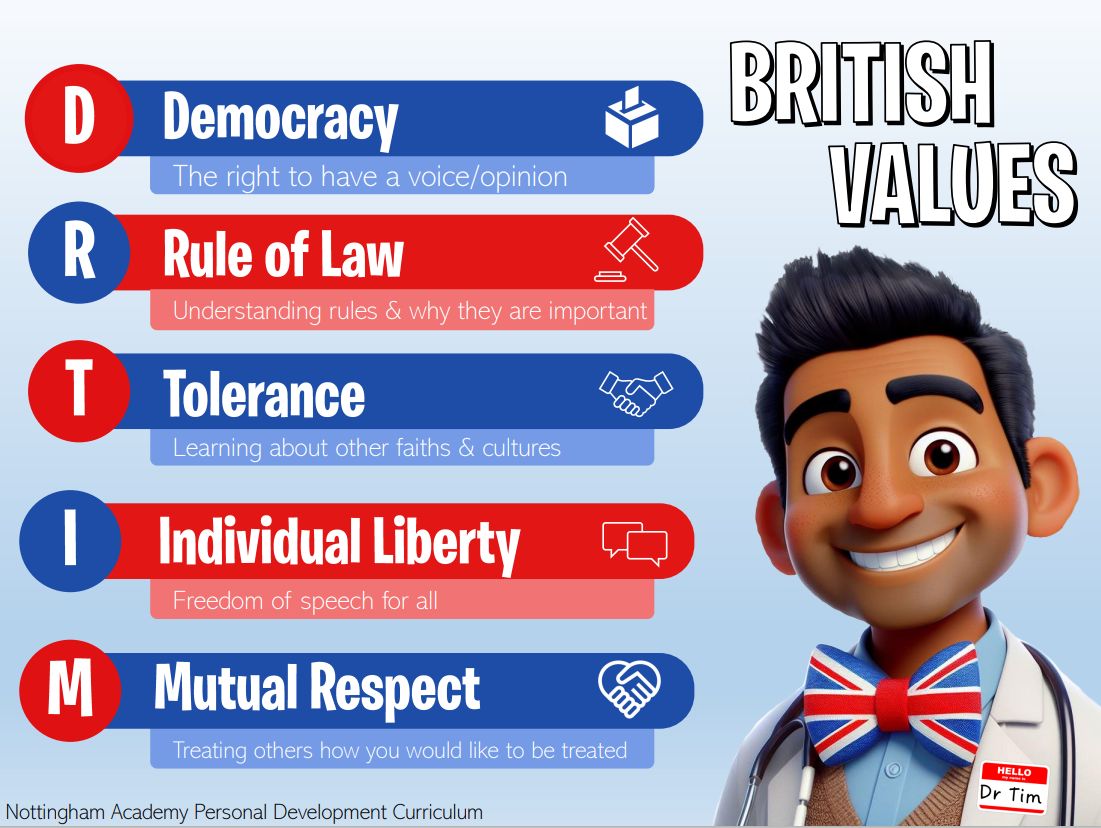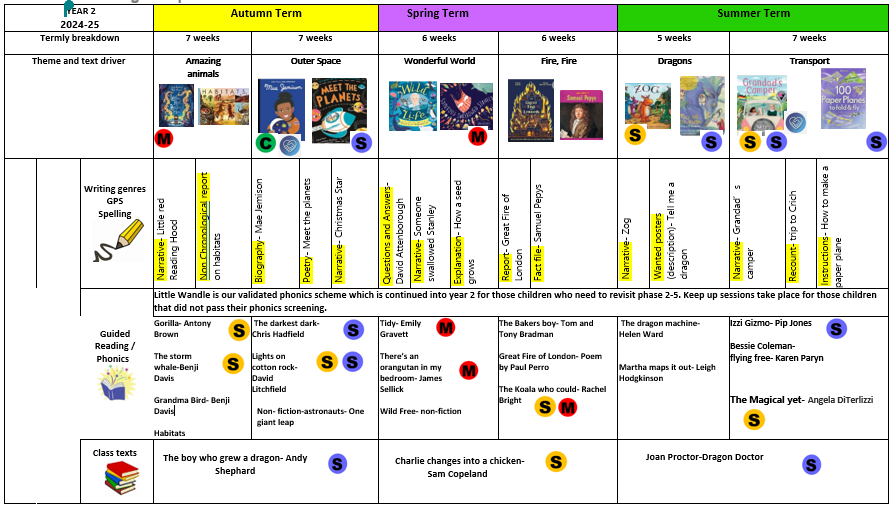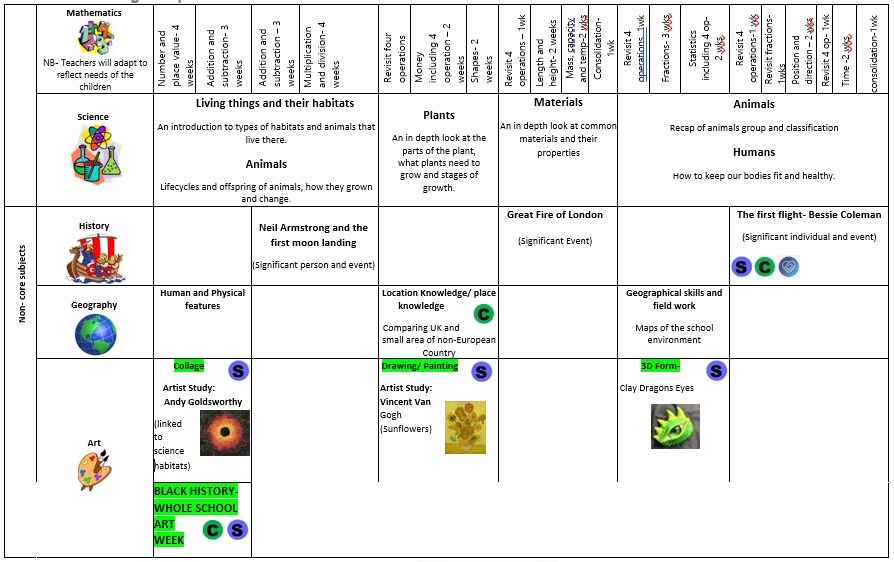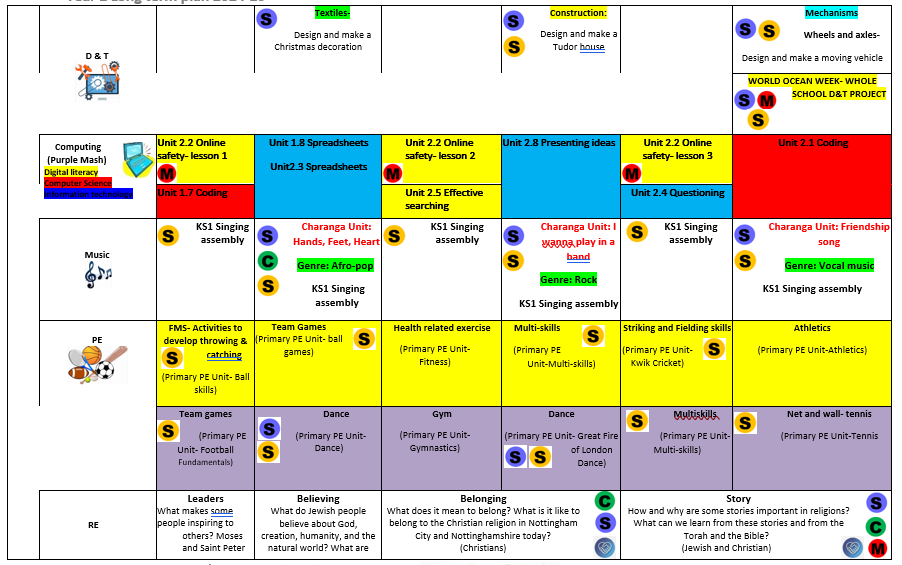British Values
Promoting British Values at the Nottingham Academy
Purpose:
The DfE have outlined the need “to create and enforce a clear and rigorous expectation in all schools to promote the fundamental British values of democracy, the rule of law, individual liberty and mutual respect and tolerance of those with different faiths and beliefs.”
At Nottingham Academy, we endeavour to ensure that all children are fully prepared for ‘life beyond Nottingham Academy’ and life in modern Britain. In actively promoting these values, we challenge those opinions or behaviours that are contrary to fundamental British values. At Nottingham Academy, we use Dr Tim to help us recall our British values and refer to these in lessons and in incidental opportunities.

We aim to reinforce the government’s values regularly, in the following ways:
Democracy: 
We ensure that the children of Nottingham Academy have a voice and that their voice is heard and listened to. We actively encourage children to show independence, speak up and provide the opportunity for them to share their views through pupil interviews, questionnaires and classroom’ worry boxes’. Our Well-Being Council meet regularly to discuss aspects of well-being, including behaviour, transition and friendships in school. Our class Well-Being Council representatives do an excellent job of bringing issues to discuss and feedback from their peers to regular council meetings, which are led by our school ELSA lead. We develop an environment in which children feel safe to express themselves and know that their opinion is valued.
We also seek our parent’s opinions and always aim to open dialogue between home and school. Through meetings, assemblies, coffee mornings and questionnaires, parents are given plenty of opportunity to share their views and opinions. The launch of our Nottingham Academy Community Forum aims to allow further prosect for successful school and parent collaboration around enhancing opportunities in school, enriching community links and supporting with school events.
Children are given the opportunity to vote in various scenarios across school life and understand that this is to ensure every voice is heard and promotes fairness. Children in EYFS and Year 1 vote daily for their book of the day. Children in school vote for the charities they would like to support on our annual charity day. Equally, children ae given the chance to vote for their preference for a behaviour award.
Pupil voice demonstrates a strong understanding of the importance of being heard.
Rule of Law: 
Children are introduced to the importance of laws through school rules, whether they be rules that must be followed in class, around school, or at playtimes. From starting Nottingham Academy in F1, children are taught right from wrong. Children learn the importance of rules/ laws and why they must be followed. Our well-planned behaviour curriculum ensures that our children know the expectations throughout the school day and are given regular opportunities to revisit these. Children at Nottingham Academy are given a vast amount of support to ensure that they make the right choices around their behaviour, and suitable interventions are provided to ensure children who find this more challenging have the right support to do so. Through all staff adhering to our clear behaviour policy, children understand that poor behaviour will have consequences that are always fair and consistently applied.
Pupil voice demonstrates that children understand the importance of rules and can voice what would happen if we didn't have them. Children express that they like our school rules and they help them feel safe in school.
Throughout our well sequenced history curriculum, children are also taught about the crimes and punishment of the past. In addition, woven through our PSHE programme (Jigsaw), children are explicitly taught about the importance of rules and consequences. These opportunities are mapped out using the Rule of Law symbol in our long-term plans.
Tolerance of those of Different Faiths and Beliefs: 
At Nottingham Academy, we understand our role in preparing children to take their place in a culturally diverse society. We are lucky that our children experience a wide range of cultures and beliefs through the diverse make-up of our school. The texts we choose to drive our curriculum are carefully selected to ensure there is a diverse range of characters that reflect our society. Our Religious Education curriculum explicitly plans for children to visit and experience a range of places of worship in order to build awareness and respect for faiths and beliefs different to our own. Our PSHE lessons also allow an opportunity for explicit teaching of respect and tolerance in society. We ensure that assemblies and discussions involving prejudices and prejudice-based bullying are delivered and that the key messages are then re-enforced through the curriculum. Whole school events such as culture day allow children to learn about, experience and celebrate the differences amongst us. The range of opportunities for this value to be explored across the curriculum have been plotted in on our year group long-term plans.
Pupil voice shows that our children enjoy and value learning about other faiths and cultures. Children speak with enthusiasm about their memories of our annual culture day, recalling tasting food, music, cultural dancing and the opportunities to wear their cultural dress.
Individual Liberty: 
This feeds directly into our Character Curriculum, where we encourage children to develop their self-esteem and self-confidence. We ensure that we educate and provide boundaries for children to make choices, learn, grow, make mistakes, take responsibility for their behaviour and to do so safely in a well-supported environment. Pupils are encouraged to know, understand and exercise their rights and personal freedoms and are advised how to do this safely, for example, through our E-Safety lessons and PSHE lessons. Children are explicitly and implicitly taught to challenge stereotypes and develop a strong anti-bullying culture in school. Whether it be through choice of learning challenges, of how they record their work, of participation in our extra-curricular clubs and opportunities, pupils are given the freedom to make choices.
Mutual Respect: 
Respect is one of our school values. This is modelled, taught and expected every day and forms a key part of our Character Curriculum. Respect is discussed regularly with the children during assemblies, PSHE lessons and encouraged through all aspects of the school day - from listening to the views of others in class, using our manners, to holding the doors open for others in the corridors. As a school, we ensure that all children respect one another and can value everyone as individuals. Some of the texts we have chosen to drive our curriculum explore elements of respect which spark discussions and reflection on this important value, which is made clear on our year long-term plans.
Pupil voice demonstrates that children feel listened to by their teachers by both valuing their ideas and contributions in lessons and helping them with their problems.
British Values across the curriculum:
The fundamental British Values along with social, moral, spiritual and cultural opportunities have been carefully mapped out across the curriculum to demonstrate the effective coverage of these vital aspects. An example can be seen below in our Year 2 curriculum overview. In addition to this, a document outlining the coverage of SMSC and FBV within our English texts can be found by follwing the link below.




